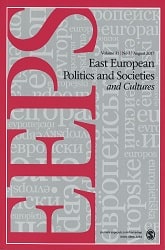Fascism under Pressure. Influence of Marxist Discourse on the Ideological Redefinition of the Croatian Fascist Movement 1941–1944
Fascism under Pressure. Influence of Marxist Discourse on the Ideological Redefinition of the Croatian Fascist Movement 1941–1944
Author(s): Ana AntićSubject(s): Civil Society, History of ideas, Political history, Marxism, Government/Political systems, Nationalism Studies, WW II and following years (1940 - 1949), Fascism, Nazism and WW II
Published by: SAGE Publications Ltd
Keywords: Ustaša; fascism; Marxism; war; resistance;
Summary/Abstract: This article analyzes how the ideological discourse of the Croatian fascist movement (the Ustaša) evolved in the course of World War II under pressures of the increasingly popular and powerful communist armed resistance. It explores and interprets the way the regime formulated its ideological responses to the political/ideological challenge of the leftist guerrilla and its propaganda in the period after the proclamation of the Ustaša Independent State of Croatia in 1941 until the end of the war. The author demonstrates that the regime, faced with its own political weakness and inability to maintain authority, shaped its rhetoric and ideological self-definition in a direct dialogue with the Marxist discourse of the communist propaganda, incorporating important Marxist concepts in its theory of state and society and redefining its concepts of national boundaries and racial identity to match the communists’ propaganda of inclusive, civic national Yugoslavism. This massive ideological renegotiation of the movement’s basic tenets and its consequent leftward shift reflected a change in an opposite direction from the one commonly encountered in narratives of other fascisms’ ideological evolution paths (most notably in Italy and Germany): as the movement became a regime, the Ustaša transformed from its initial conservatism, traditionalism (in both sociopolitical and cultural matters), pseudofeudal worldview of peasant worship and antiurbanism, anti-Semitism, and rigid racialism in relation to nation and state into an ideology of increasingly inclusive, culture-based, and nonethnic nationalism and with an exceptionally strong leftist rhetoric of social welfare, class struggle, and the rights of the working class.
Journal: East European Politics and Societies
- Issue Year: 24/2010
- Issue No: 01
- Page Range: 116-158
- Page Count: 43
- Language: English
- Content File-PDF

